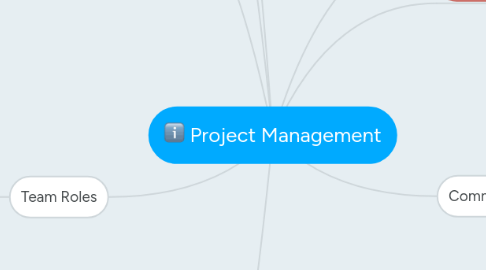
1. Use team strengths and skills
1.1. Include a task during training on how to identify these
2. Setting clear objectives
2.1. Setting and meeting interim goals
3. Bigger picture
3.1. Meeting the needs of stakeholders
4. Realistic
4.1. Tome bound
4.1.1. Meeting interim goals on time
4.2. Resources
4.2.1. Tools you can use
4.2.1.1. Create a bank of tools
4.2.1.1.1. Trello
4.2.1.1.2. Evernote
4.2.1.1.3. Doodle
4.2.1.1.4. minutes.io
4.2.1.1.5. Slack
4.2.1.1.6. Facebook (PM & Groups)
4.2.1.1.7. Draft agenda template
4.2.2. Budget
5. Planning
5.1. Back up plan "Risk"
5.1.1. Positives of things gone wrong
5.1.2. Consider team member external responsibilities
5.2. Methods used for planning
5.2.1. Create a short list with further reading materials
5.3. Steps to achieve, working backs words from goals
6. Team Roles
6.1. Team Dynamics
6.1.1. Give tasks and roles they want
6.1.2. How to work as a team?
6.1.2.1. Choosing methods
6.1.2.2. Tools to use
6.1.2.3. How to communicate
6.2. Role and responsibilities
6.2.1. Lead (Chair)
6.2.1.1. Leadership
6.2.1.1.1. Ensuring a open environment
6.2.1.1.2. Proactive seeking input and feedback
6.2.1.1.3. Opportunity to link to sources for more depth on how to do these
6.2.1.1.4. Able to facilitate
6.2.2. Clark/Secretary
6.2.3. Vice Lead
6.2.4. Team member
6.2.4.1. Size of team? Up to 7
6.2.4.2. Should be able to say NO & communicate it
7. Communication
7.1. Members able to say NO
7.1.1. Able to ask for help
7.2. Team able to negotiate
7.2.1. Arrive at compromise
7.3. Lead able to articulate aim
7.4. Able to listen to others
7.4.1. Able to Chair
7.4.1.1. Able to read body language
7.4.1.2. Types of questions to ask and what they are used for
7.5. Able to respect others
7.6. Lead able to delegate tasks
7.6.1. Ensure tasks and owner is recorded
7.6.2. Empowers team members to carry out tasks
7.7. Lead able to have difficult conversations
8. The ideal team member
8.1. Taking personal responsibility
8.1.1. Communication
8.1.1.1. Attendance or absence of meetings
8.1.1.2. Able to say NO
8.1.1.3. Able to ask for help or express challenges
8.1.1.4. Engaging with tools
8.1.2. Being prepared for meetings
8.1.3. Completing tasks on time
8.2. Watching out for others
8.2.1. Raising concerns with team lead
8.2.2. Supporting others
8.3. Knowing yourself
8.3.1. Skills and knowledge
8.3.2. Working style
